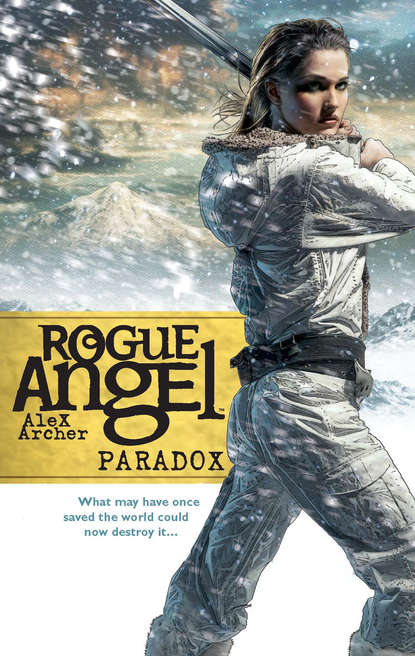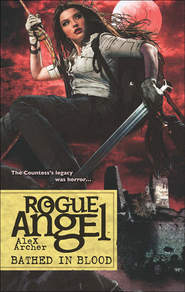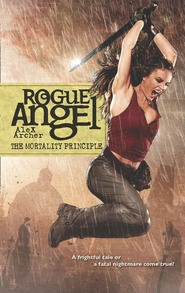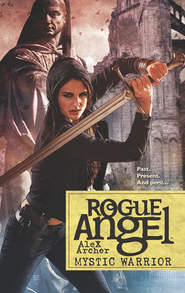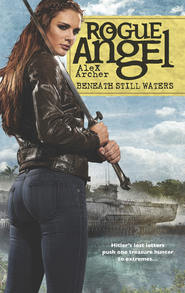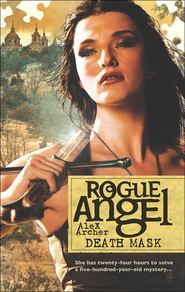По всем вопросам обращайтесь на: info@litportal.ru
(©) 2003-2025.
✖
Paradox
Автор
Год написания книги
2019
Настройки чтения
Размер шрифта
Высота строк
Поля
She ate as she studied him. Not much deterred her from eating when she was hungry. Her lifestyle meant she took in a lot of calories and used them all.
You’ve been taken in before, she reminded herself. But the rabbi would have to be a diabolically skillful actor to fake this goofy artlessness, this seeming fundamental decency. He strikes me as kind, she thought. There’s a virtue I encounter way too infrequently.
She sighed. “I hope I can live up to your expectations, Levi,” she said. “I’ll certainly try.”
He lit up. “You mean you’ll do it?”
“Against my better judgment,” she said, “yes.”
4
Annja was sitting at a table with a lot of men in a hotel conference room in Ankara, Turkey.
“You must understand,” said the enormously tall, gaunt man with the eagle’s-beak nose and dark circles under his eyes, “that there exist certain elements within my government who…resent American patronage of Kurdish separatists.” He wore an olive-drab military uniform with a chestful of colorful ribbons.
The room air-conditioning worked with a nasty subliminal whine. It was a race whether it would slowly but inexorably give Annja a blinding headache or drive her mad. It worked though, keeping the temperature to arctic levels despite unseasonable heat in the streets of the Turkish capital outside, almost three thousand feet above sea level in the middle of the central massif of the Anatolian peninsula.
Unfortunately, it also reacted in some insidious way with the smoke generated by their host’s harsh-smelling Turkish cigarette to produce about the same reaction as tear gas in Annja’s eyes. The Ankara Sheraton had a strict no-smoking policy. Apparently being a general of the Turkish army allowed you to opt out on that. Big surprise there, Annja thought.
“Well, General,” Leif Baron said, leaning back in his chair and tapping a pen on the polished tabletop before him. “You should understand the Kurds have been our good friends in Iraq. They’re the best indigenous allies we have there. What was that, Mr. Wilfork?”
“Nothing of consequence,” said the man he’d addressed the last question to. He answered in what sounded to Annja like an Australian accent. It had also sounded as if he’d muttered, “The only ones who don’t switch sides or bloody run away,” under his breath at Baron’s mention of the Kurds.
He wore a tan tropic-weight suit that fit his bulky frame as if he’d picked it off the rack, possibly at Goodwill: the suit was taut to near splitting at the shoulders, straining the buttons over his belly, the fabric bagging and rumpling at the chest. Despite the room’s chill he mopped at his big crimson face with a scarlet handkerchief. His hair was thinning, combed over the top and white-tinged with yellow, although Annja had the impression he was only in his early fifties. She glanced at the equally tall and out-of-shape-looking Charlie Bostitch, who lounged across the table from the general at Baron’s side, looking smug and at ease.
“Nonetheless, the United States has seen fit to provide assistance to certain Kurd groups internationally recognized as terrorists,” the general said. “Indeed, the United States itself so recognized them, before they found a use for their services. Please, gentlemen—I do not raise these points in order to obstruct or cause complications. I, too, am eager for this expedition to take place. But it must be founded on a realistic appraisal of the situation, yes?”
“We’ve paid out plenty of money,” Baron said, lounging back in his seat and crossing one leg over the other. He wore a pale yellow polo shirt, stretched tight over the bulging muscles of his chest and upper arms, and khaki trousers. “That ought to smooth our way.”
“Now, now, gentlemen,” Bostitch said, shaking his head. “Why don’t we all just try to get along, here? We’re men of goodwill. And the issues are bigger than all of us, after all.”
General Orhan Orga gazed at him with his sad bloodhound eyes for a long moment before nodding.
“It is also true,” he said, “that the army feels especially embattled now in its traditional role of maintaining the official secularity of our Turkish Republic against a rising tide of Islamism in political life. It is, I fear, a case of democracy in practice defeating democratic ends.”
“Oh, I can understand that,” Bostitch said, nodding his head. “And after all, you’re fighting the good fight against the Muslim infidel.”
“Dear Lord,” Wilfork said out loud into a sudden silence. Annja noted that even the half-dozen young men, Rehoboam Christian Leadership Academy graduates all, who made up the bulk of the expedition were staring at their leader in something like dismay.
Orga’s mouth compressed to a line beneath his magnificent brush of moustache. “Please understand that a majority of Turks, inside the army and out, are faithful followers of Islam. It is the job of the army, as outlined in our constitution, to maintain a clear distinction between religion and politics. That is all.”
“Ah,” Bostitch said, nodding and smiling. “Separation of church and state. That’s—”
He stopped and did an almost comical take. He’d caught himself just in time praising a political concept he was quite famous for denouncing back home in the States. Annja scratched her upper lip to hide an incipient grin that she just couldn’t quite hold in. She wondered if their fearless leader had been covertly hitting the bottle again.
Despite the whirlwind rapidity with which she’d been whipped from Manhattan’s Chinatown to the Turkish capital of Ankara the process had still managed to entail lots of time sitting in airports waiting for flights. Using that time and Wi-Fi she’d done a bit more research on her current associates. She had discovered some interesting things about their employer. Including that he had a reputation as a real party animal, who every couple of years made a weepy public renunciation of his bad old ways, only to be caught in a few weeks or months half in the bag with his face between some stripper’s boobs. Annja was experiencing more than a few second thoughts.
She shot a quick glance to Levi. He looked amiably befuddled. Still, he was being a good sport about it all.
He reminded her why she still felt committed to this project, increasingly weird and possibly, well, doomed as it seemed. There was his enthusiasm. And his innocence. And, oh, yes—the lure of uncovering ancient mysteries. And maybe a hint of adrenaline rush. Just a teensy, tiny bit.
“General Orga,” Larry Taitt said with horrible playful-puppy brightness, “the key point here is that we’re relying on you to smooth our way east to Mount Ararat. And I’m sure our fate, and the fate of our expedition, couldn’t be in more capable hands.”
Annja looked at the floppy kid—she couldn’t help thinking of him that way—with a certain expanded understanding. He may be a happy-go-lucky goof who’d had the bad judgment to lock himself into weird religion and weirder associates. But he clearly had something on the ball.
Orga was frowning still, but now it was with a sort of generalized concern. “I will certainly do what I can for this expedition,” he intoned. “It is, after all, for science.”
“Science,” Wilfork said. He raised his glass of beer. “I’ll drink to that.”
Leif Baron, who had apparently decided to reclaim the “good cop” role, slapped his hands noisily on his thighs and stood. “We know you will, General Orga. Thanks for coming out.”
Everybody else stood, so Annja did likewise. She wasn’t sure what had actually been accomplished here. If anything. But now Baron and Bostitch were showing all hail-fellow camaraderie to the general, who himself was looking as jovial as he could with those bloodhound eyes. She was not a woman who yielded to gender stereotypes, for either sex, and if anything tended to consider herself, and be accepted as, one of the boys. But this scene baffled her. Maybe it was some male-bonding ritual she hadn’t encountered yet.
She found herself out in the curving hallway walking away. Aside from the smoking thing the Ankara Sheraton was a fabulous hotel. She felt a strong yearning to return to the extravagant comfort of a room she never could have afforded on her own. Then maybe a few laps in the huge indoor swimming pool would get her tuned up again.
“Ms. Creed,” an Australian-accented voice called from behind her. “Wait one, if you’d be so kind.”
She stopped and turned. Robyn Wilfork lumbered after her. His gait resembled that of a none-too-well-trained dancing bear. She couldn’t attribute it to alcohol: he had a long torso and short, bowed legs for his height.
Well, maybe some of it was alcohol, considering how hard he’d been hitting the beer back in the room.
“Might I offer you a drink?” he asked. “The hotel sports an altogether splendid bar.”
She was on the cusp of answering that she thought maybe he’d had enough in that department when she saw a knowing look come into his blue eyes.
“Nothing improper, I assure you,” he said hastily. “It just strikes me that, since we appear to be the odd ones out—quite a striking fact itself, in this company—we might profitably get to know one another.”
“Ah,” she said, “sure. Why not?”
THE COPPER BAR OF ANKARA’S Sheraton Hotel and Convention Center was a splendid bar, Annja had to admit. The bar proper was a highly polished teak arc beneath outward-expanding concentric rings of copper hung from the ceiling. It was such a striking effect that she actually permitted, not altogether in accordance with her better judgment, the journalist to buy her a glass of wine. Having placed her order with the bartender, who appeared to be French, she followed Wilfork as he rolled like a sailor in a high sea to one of the blue-gray chairs. These proved to be quite comfortable.
The bar was almost empty. Soft chamber music played in the background. While the afternoon view outside the tall windows was pleasant, prominently featuring an outdoor pool and the tall tower in which the rooms were located, she chose to sit with her back to them. She always liked to be able to see the entrance of the place she was in. The more so since there seemed to be some possible controversy concerning their expedition.
Which wasn’t totally surprising, inasmuch as the whole enterprise was flamboyantly illegal.
“So, Mr. Wilfork,” she said, “what brings you all the way from Australia?”
“Australia?” He laughed heartily. “Oh, no, no. My dear, you’re grievously wrong. I am a Kiwi, born and bred.”
Her eyebrows rose in surprise. “I’m sorry. I guess I don’t know enough to tell a New Zealand accent from Australian one.”
“You are quite forgiven. But I must say, the question you want to ask is, what is a confirmed atheist and semi-lapsed communist doing wrapped up in all of this religious mummery?”
That made her pull her head back and blink. “You’re right. I guess that is a better question.”
“Perhaps the answer is the same as what might bring a respected American archaeologist of decidedly skeptical bent into such an operation,” he said. “Simply, money.”
She frowned slightly. “It’s not so simple,” she said. “Not in my case. And anyway, what use does a communist have for money?”





